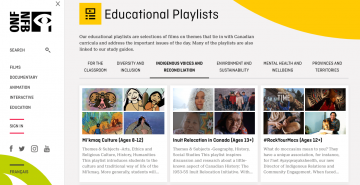A film can open your heart and mind at the same time. As you are watching you are receptive to a range of experiences and emotions in a short amount of time. This week in the mentoring circle, we will explore a video streaming resource that is available through UBC Library — NFB Campus (National Film Board). With over 5,000 films, including documentaries, animations and interactive productions, NFB showcases films that take a stand on issues of global importance including stories about the environment, human rights, international conflict, Indigenous issues and more. Education teacher candidates can contact eResources & Access via their Help Form to request the “activation key” for a personal CAMPUS account to access Educator resource tools and study guides for use in connection with classroom.
The educational resources on NFB are made by teachers for teachers. Films are classroom ready and cover a wide variety of K–12 and post-secondary subjects. Take advantage of hundreds of guides that contain activities and discussion questions created by educational experts and Canadian teachers. You can also quickly and easily create personalized film clips to share with your class using Clip Creator. Engage your students with thematic content from any NFB film by customizing and sharing relevant clips from their playlist feature. Their educational playlists are selections of films on themes that tie in with Canadian curricula and address the important issues of the day. Many of the playlists are also linked to study guides.
In 2018, the NFB launched a cinema collection of over 200 films by Indigenous directors — part of a three-year Indigenous Action Plan to “redefine” the NFB’s relationship with Indigenous peoples. Below is a list of recommended films to watch from NFB’s Indigenous voices and reconciliation educational playlist. These four films include pedagogical evaluations and study guides at the NFB Campus:
Our People Will Be Healed is one of several films by Abenaki filmmaker Alanis Obomsawin, one of Canada’s most distinguished Indigenous filmmakers, available to watch on NFB. This is Obomsawin’s 50th film and it reveals how a Cree community in Manitoba has been enriched through the power of education. The Helen Betty Osborne Ininiw Education Resource Centre in Norway House, north of Winnipeg, receives a level of funding that few other Indigenous institutions enjoy. Its teachers help their students to develop their abilities and their sense of pride.
nîpawistamâsowin: We Will Stand Up is a film that centres on the murder of Colten Boushie, and depicts his family’s struggle to attain justice in a racist political system. On August 9, 2016, a young Cree man named Colten Boushie died from a gunshot to the back of his head after entering Gerald Stanley’s rural property with his friends. The jury’s subsequent acquittal of Stanley captured international attention, raising questions about racism embedded within Canada’s legal system and propelling Colten’s family to national and international stages in their pursuit of justice. Sensitively directed by Tasha Hubbard, nîpawistamâsowin: We Will Stand Up weaves a profound narrative encompassing the filmmaker’s own adoption, the stark history of colonialism on the Prairies, and a vision of a future where Indigenous children can live safely on their homelands.
The Whale and the Raven is a film that illuminates the many issues that have drawn whale researchers, the Gitga’at First Nation, and the Government of British Columbia into conflict and struggle to protect Indigenous territory against the pressure and promise of the gas industry. Director Mirjam Leuze’s The Whale and the Raven illuminates the many issues that have drawn whale researchers, the Gitga’at First Nation, and the Government of British Columbia into a complex conflict. As the people in the Great Bear Rainforest struggle to protect their territory against the pressure and promise of the gas industry, caught in between are the countless beings that call this place home.
RUMBLE: The Indians Who Rocked the World tells the story of a profound, essential, and, until now, missing chapter in the history of American music: the Indigenous influence. Featuring music icons like Charley Patton, Mildred Bailey, Link Wray, Jimi Hendrix, Jesse Ed Davis, Buffy Sainte-Marie, Robbie Robertson, Randy Castillo, RUMBLE will show how these talented Native musicians helped shape the soundtracks of our lives. Thee film highlights Indigenous contributions to North American popular music, including (but not limited to) rhythm and blues, jazz and rock ‘n’ roll. In so doing, the documentary demonstrates how the development of some popular genres is due in part to the talent and efforts of Indigenous Peoples.
Films are not about fancy tech, they are about revealing the truth with heart and passion and respecting ethical boundaries and community protocols. When individuals have the choice of seeing the world in a different way and when they are able to question the sources of their beliefs, this is the beginning of social change. Any good film starts with the premise of social change and anyone can do one. UBC has excellent tools that can help you edit your videos to become understand the work behind the scenes. The popular software Snagit and Camtasia are now available UBC-wide at no cost. Both software packages are available for download through the Canvas Learning Management System.
- Snagit is a powerful screen capture tool that allows you to easily capture, modify and share screenshots and basic video captures of your computer screen. This tool is invaluable for instructional and support purposes.
- Camtasia complements the functionality of Snagit and includes comprehensive video and audio recordings of your screen. This software has all the editing tools to create great dynamic video content and allows for easy sharing of your videos with anyone, anywhere.
